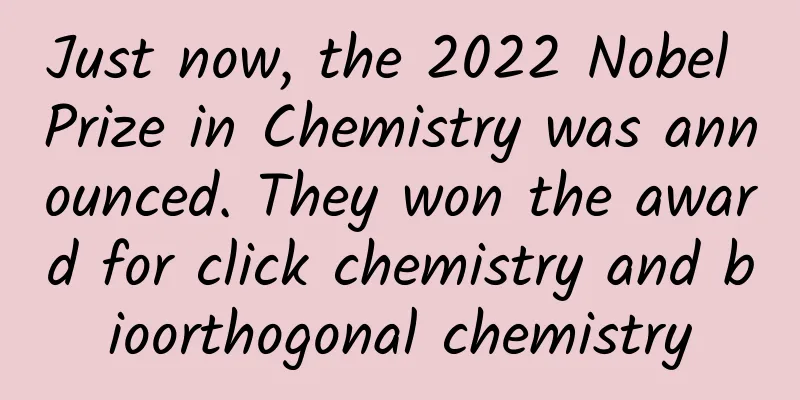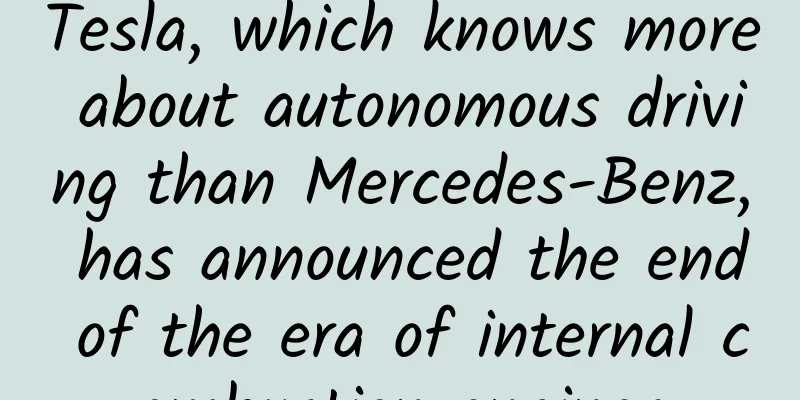Just now, the 2022 Nobel Prize in Chemistry was announced. They won the award for click chemistry and bioorthogonal chemistry

|
At 5:45 pm Beijing time on October 5, 2022, the 2022 Nobel Prize in Chemistry was announced. Carolyn R. Bertozzi, Morten Meldal and K. Barry Sharpless won the award for their outstanding contributions to the development of click chemistry and bioorthogonal chemistry. Carolyn R. Bertozzi (American chemist) Morten Meldal (Danish chemist) K. Barry Sharpless (American chemist) Chemistry is the science most closely related to Nobel's work, and it is also the second award-winning field mentioned by Nobel in his will. Chemistry is more like a center at the intersection of different scientific fields . On one side, it is close to physics, which provides its theoretical basis, and on the other side, it is close to biology, because biology is actually an extension of the most complex field of the entire chemistry discipline. In terms of award-winning fields, at least 25 winners have made contributions to organic chemistry research, more than any other field. Judging from the development trend of the Nobel Prize in Chemistry in the 20th century, with the development of computer technology, theoretical chemistry and computational chemistry will flourish in the 21st century, and the study of biological systems may become more important, shifting from single macromolecules to large interactive systems, such as chemical signals and neural functions including the brain. 187 Nobel Prize winners in Chemistry The Nobel Prize in Chemistry has been awarded since 1901. As of 2021, a total of 187 people have won the prize. The first Nobel Prize in Chemistry was awarded in 1901 to Dutch chemist Jacobus Henricus van 't Hoff "for his discoveries of the laws of chemical kinetics and of the osmotic pressure of solutions." British biochemist Frederick Sanger is the only scientist to date to have won the Nobel Prize in Chemistry twice , while the other two Nobel Prize winners, Marie Curie and Linus Pauling, were in different disciplines. Historically, the Nobel Prize in Chemistry has been suspended eight times, in 1916, 1917, 1919, 1924, 1933, 1940, 1941 and 1942. List of Nobel Prize winners in Chemistry over the years: https://www.nobelprize.org/prizes/lists/all-nobel-prizes-in-chemistry/ Youngest and oldest winners The youngest Nobel Laureate in Chemistry to date is French physicist Frédéric Joliot-Curie, who won the Nobel Prize in Chemistry in 1935 together with his wife Irène Joliot-Curie (Marie Curie’s eldest daughter). He was only 35 at the time. Photo: Joliot-Curie couple Historically, they missed the Nobel Prize twice : In 1932, the Joliot-Curie couple worked together to bombard beryllium, lithium, boron and other elements with alpha rays produced by radioactive polonium, and discovered unprecedented penetrating radiation, but failed to correctly identify it. Later, it was summarized and studied by James Chadwick, a student of Ernest Rutherford, and was confirmed as a neutron. Chadwick also won the 1935 Nobel Prize in Physics for this. The Joliot-Curies were the first to obtain the positron in their experiment, but because they failed to correctly identify it, the honor was ultimately given to Carl David Anderson, who was awarded the 1936 Nobel Prize in Physics for this. The oldest Nobel Laureate in Chemistry is John Goodenough, who was 97 years old when he won the prize in 2019. He is also the oldest person to have ever won a Nobel Prize. Photo: John Goodenough Female winners So far, among the 187 Nobel Prize winners in Chemistry, 7 are women . They are: In 1911, Marie Curie was awarded "for her discovery of the elements radium and polonium, for her purification of radium and for her studies of the properties of this remarkable element"; In 1935, Irène Joliot-Curie and her husband Frédéric Joliot-Curie were awarded the prize “for the synthesis of new radioactive elements”; In 1964, British biochemist Dorothy Hodgkin won the award for "using X-ray technology to determine the structure of some important biochemical substances"; In 2009, Israeli crystallographer Ada E. Yonath shared the award with American biochemist Thomas Steitz and British structural biologist Venkatraman Ramakrishnan for their research on ribosome structure and function. In 2018, American chemical engineer Frances Arnold won the award for "designing the directed evolution of enzymes"; In 2019, French microbiologist Emmanuelle Charpentier and American biologist Jennifer Doudna won the award for "developing a method for gene editing technology." List of Nobel Prize winners in Chemistry in the past five years 2021 Nobel Prize in Chemistry German chemist Benjamin List and Scottish-American chemist David MacMillan shared the award for "the development of organic asymmetric catalysis." 2020 Nobel Prize in Chemistry French microbiologist Emmanuelle Charpentier and American biologist Jennifer Doudna shared the award for "developing a method for genome editing." 2019 Nobel Prize in Chemistry American solid-state physicist John Goodenough, British chemist Stanley Whittlingham and Japanese chemist Akira Yoshino shared the award for "developing the lithium-ion battery." 2018 Nobel Prize in Chemistry Frances Arnold, an American chemical engineer, won the award for "designing the directed evolution of enzymes"; American chemist George P. Smith and British biochemist Gregory P. Winter shared the award for "developing phage display technology for peptides and antibodies." 2017 Nobel Prize in Chemistry Swiss biophysicist Jacques Dubochet, German-American biologist Joachim Frank and Scottish molecular biologist and biophysicist Richard Henderson shared the award for "the development of cryo-electron microscopy techniques for high-resolution structural determination of biomolecules in solution." |
>>: Jump? Still jumping? If you jump again, you will... go to hell!
Recommend
Baidu Search launches new account management diagnostic analysis, increasing leads by 20%
There are many new optimizers entering the indust...
The latest news on Shenzhen’s lifting of lockdown in 2022: When exactly will the epidemic be lifted?
In recent days, Shenzhen has reported new local c...
China's auto market: Tesla's sales in January 2025 fell 11.5% year-on-year, while BYD's sales increased 47%
Affected by increasingly fierce market competitio...
How long will it take for your job to be replaced by a machine?
Many people believe that the world is about to us...
Essential for driving! Nine pictures to help you avoid these "blind spot killers"
Qingming Festival is here The number of people vi...
Wedding photography industry, Mayu APP promotion and distribution skills!
With the arrival of summer, the wedding photograp...
Insights into female marketing trends!
With the development and penetration of mobile In...
When it comes to camping outdoors, safety comes first!
As the weather clears up and the flower viewing s...
After 23 years of water conservation, a "Tianshan Lake" has been created here!
The beautiful Tianshan Mountains nourish all thin...
Look, the first message sent by humans to the universe is the real broadcast era
Arecibo's first active signal sent into space...
As expected of the “elves” on the rock wall, the mountain goats’ climbing ability is truly amazing!
(The source of this issue’s material is photo.net...
How does a frog's slippery tongue catch a fly?
When it comes to frog hunting, the following scen...
A comprehensive summary of Xigua Video live selling skills!
Summary of Xigua Video live streaming sales techn...
"Sky City" on the Qinghai-Tibet Plateau
Loading long image... Source: China Tibet Net, So...
iOS 9 Split Screen Multitasking: Getting Started (Chinese Version)
important This is preliminary documentation for a...









